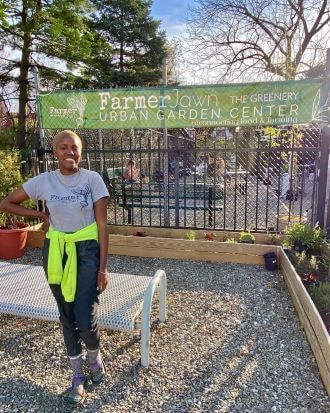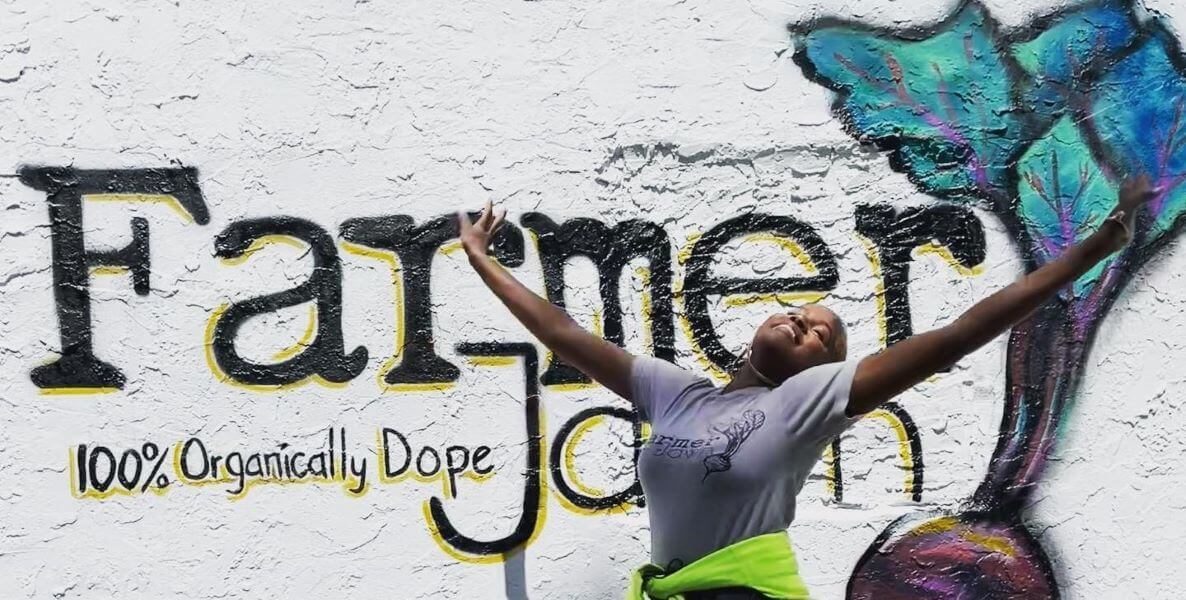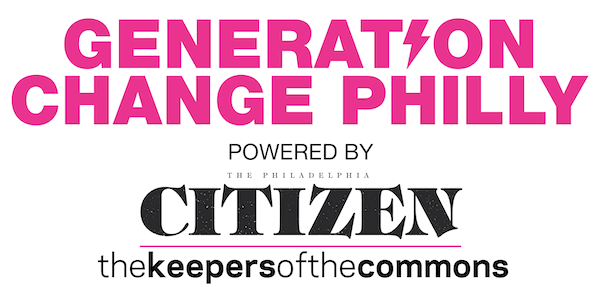Christa Barfield is an urban horticulturist, entrepreneur, and agricultural educator, but on her Elkins Park farm, she happily calls herself a farmer. Tending rows of crops including tomatoes, turnips, arugula, and a variety of herbs, she relishes getting her hands into the soil. The mother of two is also founder and CEO of Viva Leaf Tea, growing and making locally grown organic herb infused teas, honeys, and syrups.
In addition, she oversees growing operations in Elkins Park and at several sites in Philadelphia for her 80-plus-member CSA (community-supported agriculture) FarmerJawn, providing a source for weekly fresh produce and locally made goods, as well as educational events on gardening, urban agriculture, cooking, and community celebrations like an upcoming pig roast. And, she manages retail operations at her recently opened food-focused garden store in Germantown.
With keen business sense, vision, adaptability and the belief that “the universe works in its own way,” Barfield is an irrepressible leader of today’s urban farming movement in Philadelphia. For her leadership, impact, and especially for her work bringing her farms’ and farming’s benefits to more Black and Brown Philadelphians, Christa Barfield is a Generation Change Philly fellow.
The benefits of urban agriculture are environmental, economic and social. Farmland in cities prevents soil runoff, reduces sewer overflows, improves air quality and reduces transportation costs. Community-supported agriculture ensures that capital stays within the community and promises economic growth. Technological innovations like vertical farming, hydroponics, and aquaponics allow urban farmers to operate outside the traditional growing seasons.
Several grassroots organizations in Philadelphia are working to re-establish Black- and Brown-led agriculture, educating their communities on urban farming, reclaiming the cultural legacy of BIPOC farmers and advocating for local economies.
Soil Generation, an agroecology coalition of women, non-binary farmers, and organizers, are focused on community control of land and food. In West Philadelphia, Urban Tree Connection has developed a network of garden and farm sites over the last 20 years across Haddington, encouraging community engagement and education. In Bartram’s Garden, spiritually centered Sankofa Community Farm produces over 15,000 pounds of produce annually for local markets with the help of community elders, volunteers and paid high school interns.
How the idea was planted
Growing up in Germantown, Barfield participated in science fairs and the Franklin Institute science program. A huge fan of the show CSI —”I never missed an episode” — she initially wanted to be a forensic pathologist. Instead, her mother, a nurse and “life student of medicine” who pursued her education through a doctorate, inspired Barfield to enter healthcare administration, earning her BA from St. Joseph’s.
After 10 years in the industry and promotion to a management position, Barfield began to experience burnout. “It’s not often people get to do the work they went to school for; it’s truly a blessing, one would think,” she says. “And then you get there, you’re finally making it, and you climb all the way up … and you’re miserable. It’s like, I didn’t do all that for this, right?”

So, Barfield took a leap of courage, faith, and guts. She resigned from her job, and in January of 2018, was on a plane to vacation in Martinique where she planned to practice her French. She did not have any high expectations of this trip — and certainly didn’t expect it to spark her love of agriculture. “I was focusing on whether the Airbnbs had a pool,” she laughs.
Her first host, a Thai chef, made her tea with herbs fresh from his garden. “I’ve never experienced anything like that,” Barfield recalls. “This is really garden-to-cup, I’m seeing the actual plants that I’m about to consume.” Her next host made cocktails from coconuts grown on his land. After one of his sons took her on a tour of the area, she decided to tag along with him to work.
“I looked around and saw a bunch of farms, but none that I found were Black-owned,” says Christa Barfield.
At a nearby farm, they picked fruits and vegetables and packed boxes for pickup by local residents. She was seeing community-supported agriculture in action: “They had envelopes on each box where the members or their patrons would come and drop their 20 euros in, and then they take their box and go. I was just like, okay, cool, I’ve never seen this before. How dope is this?”
Barfield was struck by the integration of agriculture into the community’s lifestyle. “This is just how they lived: We come get our food, and we know who grew it. I was blown away by that and wanted to learn more about those practices. What does that look like in Philadelphia? What does that look like in America?”
Back home, Barfield planned how to create a sustainable business that combined her education with enriching herself and the community through agriculture. Before leaving her job, set herself up with gig work to supplement what she had in savings. “I quit my job, and I had responsibilities. How do I generate revenue to sustain my home, my car, my kids? And the answer was okay, you create a business,” she explains. Her experience in Martinique motivated her to begin with tea.

She seized an opportunity to do some research and development at Schuylkill Center for Environmental Education, growing herbs, developing flavors, and practicing farming techniques. That Mother’s Day, a friend gifted her a 24-square-foot greenhouse. From her backyard in Germantown, Barfield began to grow and craft her blends: gingerberry and lemonberry teas, and honey infused with lavender or turmeric. By August 2018, Viva Tea Leaf was born.
At first, her operation was low-tech and the batches small, but word of mouth paid off and she began to see revenue and started scaling up production. When buyers Scott Case and Hunter Fike of DiBruno Brothers came across her booth at a farmers market, Barfield called it serendipitous. Soon, Viva Tea Leaf products were sharing shelves with some of the world’s top teas at Philly’s version of Dean & DeLuca.
With a revenue stream generated, Barfield prepared to start her Martinique-inspired CSA. She began to explore. “The natural thing to do is to find farms so that you can start doing research on how they operate,” Barfield explains. “I looked around and saw a bunch of farms, but none that I found were Black-owned.”
The CSA’s roots in Black history
The CSA model in the U.S. can be traced back to Booker T. Whatley, a Black horticulturist and agricultural professor at Tuskegee University in Alabama. During the Civil Rights Movement, Whatley advocated for regenerative agriculture and worked with Black farmers to develop “pick-your-own farms” and “clientele membership clubs,” where customers paid in advance for the season of produce, guaranteeing business for the farm. Despite Whatley’s efforts toward sustainable agriculture and an “agrarian Black middle class,” between 1910 and 1997, Black farmers lost 90 percent of their land. Today, just two percent of farmland owners are people of color.
“I researched to have a better understanding of the correlation between Black heritage as it relates to slavery and farming, and then turned it back to that’s the reason why I don’t know what a CSA is,” says Barfield. “Providing spaces where people of color can feel safe in the outdoors is essentially us decolonizing the outdoors, so that we can bring people back to the land.”
With a growing profitable small business in operation and a solid education on seeds, planting, and farming techniques under her belt, Barfield was ready to bring a CSA into her community. The Schuylkill Center for Environmental Education’s community garden offered Barfield a 3,000-square foot plot to grow her herbs at scale, plus fruits and vegetables. With that and 10 people willing to sign up for membership, she launched FarmerJawn in January of 2020.
“This is just how they lived: We come get our food, and we know who grew it. I was blown away by that and wanted to learn more about those practices. What does that look like in Philadelphia?” says Christa Barfield.
“It’s really important that we are paying attention to where our food comes from,” Barfield says. “And there’s a lot of power in knowing that, and that’s really what FarmerJawn means. You know, jawn is a person, place, or thing, and when you add farmer to it, it’s a message to our community saying that anybody can farm, and if you don’t want to farm that’s perfectly fine but at least you have the option to know who your farmer is.”
Word of mouth and social media brings CSA members from all over the city. For the 2022 season, a $400 membership grants 14 weeks of fruits, a variety of organic vegetables, herbs, tea, honey, recipes — enough to feed three to four people — plus a locally produced food, home or body product. This season’s shares, which went on sale in June, are sold out.
Cidna Valentin of Germantown joined the FarmerJawn CSA when finding fresh, affordable fruits and vegetables close to home became exhausting. Upon meeting Barfield, Valentin was impressed by her suggestion of creating a separate garden for deer to keep them away from crops. “Who does that?! It is amazing how she can hold space for all members of the community!”
Being a member didn’t just change the way Cidna shops for groceries. “It feels incredibly special to venture to a local farm once per week to pick up fresh produce! I even recently used this experience in my work as a therapist; I shared it as an example of an activity that can help build community and lead to opportunities for meaningful connection with others.”
Self-sustaining communities
Judy Wicks is the co-founder of the national Business Alliance for a Local Living Economy (now called Common Future) and the founder of several local organizations focused on sustainable local economies and renewable energy, including All Together Now, which is dedicated to building self-reliant regional economies to both increase community wealth and prepare for climate change.
Like Barfield, Wicks experienced firsthand how local control over food, supply chains, and production positively impacts the community through travel to Chefornak, Alaska, with Eskimo peoples, and in Chiapas, Mexico, with the Zapatistas.
A mutual friend introduced the women at a Germantown Night Market. They connected immediately over their shared missions. “I just thought, this is a really special person. She’s got this positive energy that’s contagious,” says Wicks.
“I just thought, this is a really special person. She’s got this positive energy that’s contagious,” says Wicks.
“It is crucial to do as much as we can to be self-reliant in this time of climate change, pandemics, warfare, cyber warfare, and as global supply chains — the corporate-controlled global economy — are beginning to implode. It’s a very vulnerable position to be in for any community,” says Wicks. “To me, corporate domination is the greatest threat to our survival. And so we are working for a decentralized economy, where production of our basic needs is as close to home as possible, and therefore the power and wealth that comes from producing basic needs remains in the community.”
The benefits of localization were especially evident in Philadelphia in 2020, when Covid closed or restricted farmers markets, and local farmers pivoted to distribute food throughout the city. Green Meadow Farm, for example, had exclusively sold to restaurants and started using social media to organize CSA-style food box drop-offs.
The growing impact of FarmerJawn
After a profile on Viva Tea Leaf ran in the Inquirer in the spring of 2020, a property owner in Elkins Park reached out with an offer to rent greenhouse space to FarmerJawn. This increased both growing space (to 40,000 square feet) and CSA membership. When the greenhouse heating system failed, destroying an entire crop, and the landlord wasn’t helping, Barfield’s universe aligned again. A GoFundme campaign raised $12,000 to keep FarmerJawn afloat.
“From a tragedy, something beautiful appeared. And that’s literally my life. There are always things that occur that may seem like a setback, but then there’s always a turnaround. So I truly have to believe that everything that happens is because it’s supposed to,” she says.
In June 2021, community members looking to reestablish FarmerJawn in Elkins Park alerted Barfield to a property recently purchased by a real estate developer interested in having the land farmed. That property is now FarmerJawn’s new home, with more than five acres of land, two greenhouses, spring houses, a garage, a mushroom room and more.

This spring, Barfield opened FarmerJawn Greenery, a food-focused retail garden and learning center in Germantown. They conduct classes on healthy living, cooking, gardening for all ages and urban foraging, and host events and farm tours to share the benefits and potential of urban agriculture. To kick off summer, Wicks and Barfield jointly coordinated a summer solstice party in Elkins Park. “There was a real intergenerational, interracial and multicultural kind of feel to the event. And I was very joyous, and I can’t wait to do more events,” says Wicks.
This year, Barfield established the nonprofit FarmerJawn Foundation to raise funds to deliver educational programming for schools and to train primarily Black and Brown people interested in the urban farming business. Fundraising is also now underway for her Redefining the CornerStore Initiative, aimed at combating food deserts in low socioeconomic areas.
“That is the future, I believe, not just for Philadelphia, but for every community,” predicts Wicks. “I strongly believe that the survival of future generations will depend on what we do today to begin this work.”
For Barfield, farming carries a legacy, ties us to nature, and sustains both communities and individual bodies. She says, “Knowing where your food comes from is the optimal way to be cognizant of your health.”
The Philadelphia Citizen is partnering with the nonprofit Keepers of the Commons on the “Generation Change Philly” series to provide educational and networking opportunities to the city’s most dynamic change-makers.
![]()
MORE ON URBAN GROWING AND SUSTAINABILITY
MOST POPULAR ON THE CITIZEN RIGHT NOW
Christa Barfield, founder and farmer at FarmerJawn and Viva Leaf Tea.





